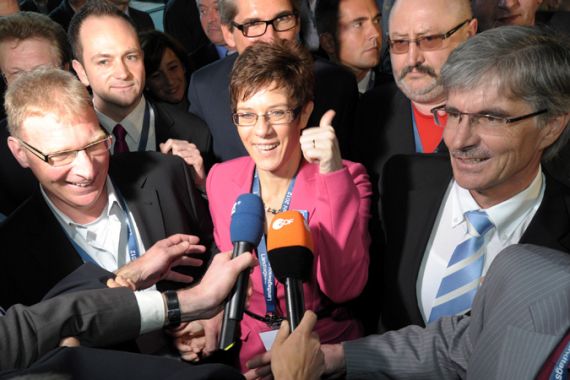Merkel’s party wins German state election
Christian Democrats win in Saarland but ally crashes out in what is seen as a precursor to next year’s national poll.

 |
| Annegret Kramp-Karrenbauer (R) of the CDU celebrated her party’s election victory in the Saarland state vote [AFP] |
German Chancellor Angela Merkel’s junior coalition ally has been roundly kicked out of a regional assembly in a vote which handed Merkel’s own party a clear victory, initial projections showed.
The pro-business Free Democratic Party (FDP), which has ruled in a national coalition with Merkel’s Christian Democrats (CDU) since 2009, garnered just around 1.5 per cent of the vote in the small state of Saarland on Sunday.
A party must attain five per cent of the vote to enter parliament.
Merkel’s conservative CDU retained its position as the state’s strongest party winning about 34.5 per cent, while the Social Democrats (SPD) followed with over 30 per cent, a significant increase on its 2009 result.
The far-left Linke party won around 16.1 per cent and the Pirate party, which burst on to the German political scene last September, won its second footing in a state parliament with more than 7 per cent.
Coalition collapse
Saarland voted more than two years ahead of schedule after conservative governor Annegret Kramp-Karrenbauer pulled the plug in January on the state’s previous government, an experimental three-way coalition with the Free Democrats and the Greens, a traditionally left-leaning party.
The gamble paid off. Hermann Groehe, the Christian Democrats’ general secretary, said the result was “a great signal for the upcoming state elections” in May in Schleswig-Holstein and then in North Rhine-Westphalia, Germany’s most populous state.
This year’s votes offer a test before national elections due in late 2013.
The Free Democrats started the year as they finished 2011, when they were voted out of five state legislatures.
The party has been battered by its failure to win tax cuts it promised before Germany’s 2009 elections, and by perceptions that it is drifting and deserves much of the blame for frequent squabbling in the national government.
In addition, Kramp-Karrenbauer blamed her decision to end Saarland’s previous government on infighting in the Free Democrats’ local branch.
“We are looking at a special regional political situation,” party general secretary Patrick Doering said, insisting that the Free Democrats have a “hope of achieving good results” in the higher-stakes votes in May.
Vice Chancellor Philipp Roesler, elected party leader only last May, can ill afford wipeouts in both those elections, which would raise serious questions about his future and raise the prospect of more upheaval in the government.
‘Grand coalition’
Kramp-Karrenbauer looks assured of remaining Saarland governor because the Social Democrats said before the election they wouldn’t form a coalition with the third-place finishers, the hard-left Left Party, which won about 16 per cent.
Saarland is economically weak and the two biggest parties plan to form a “grand coalition” to tackle its financial problems.
Social Democrat candidate Heiko Maas said last week the Left Party “fails to see financial reality” and has policies that would lead to “Greek conditions”.
The Christian Democrats’ Groehe said Sunday’s election “showed that the course of solid budgets pays off”.
The party will hope that helps it overturn a poll deficit in May against the center-left government of North Rhine-Westphalia, which opponents accuse of spendthrift financial management.
Projections showed the upstart Pirate Party entering its second state legislature, with nearly 8 per cent support, underlining its emergence as a political force across Germany, with a platform based on transparency and internet freedom.